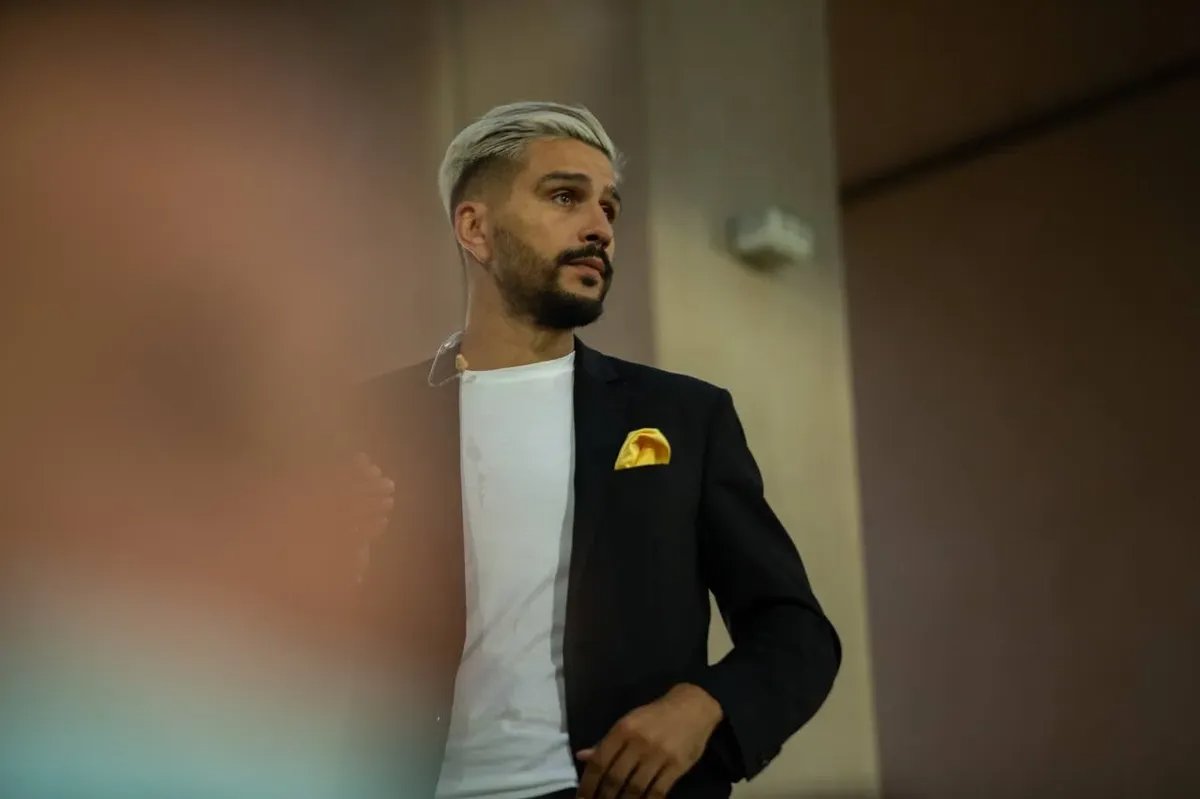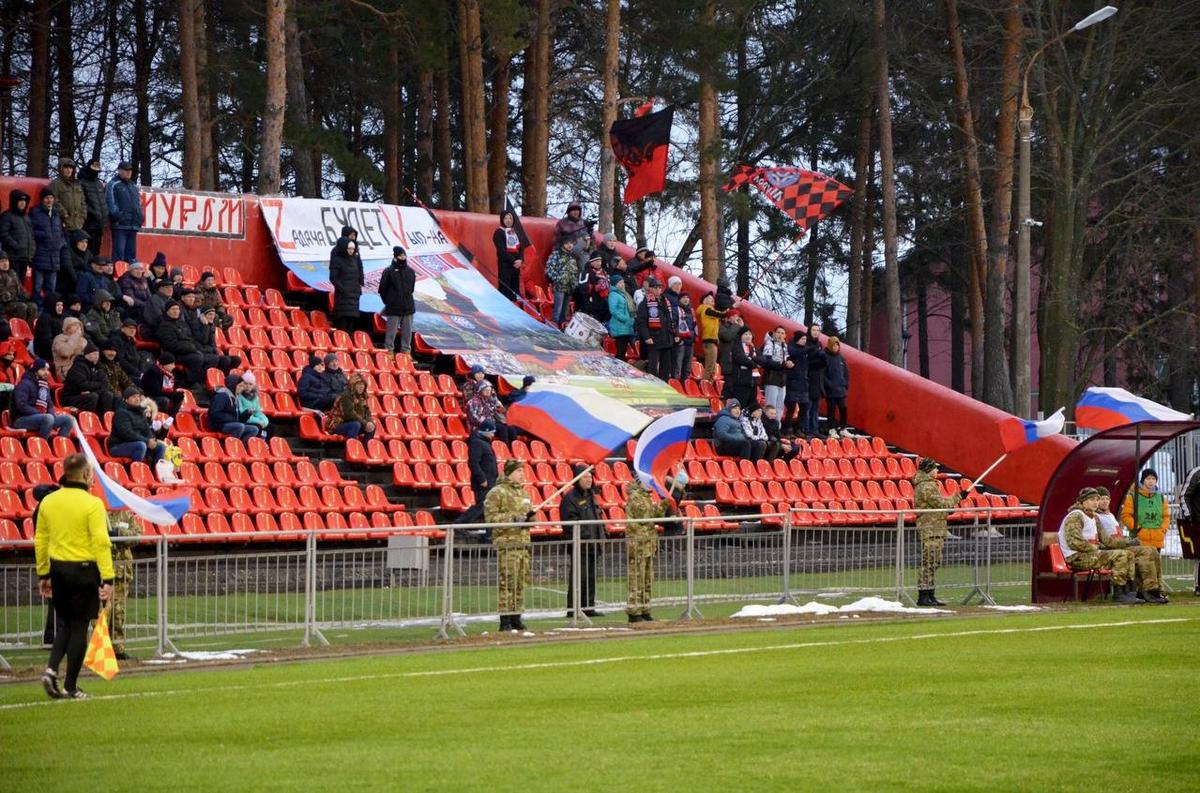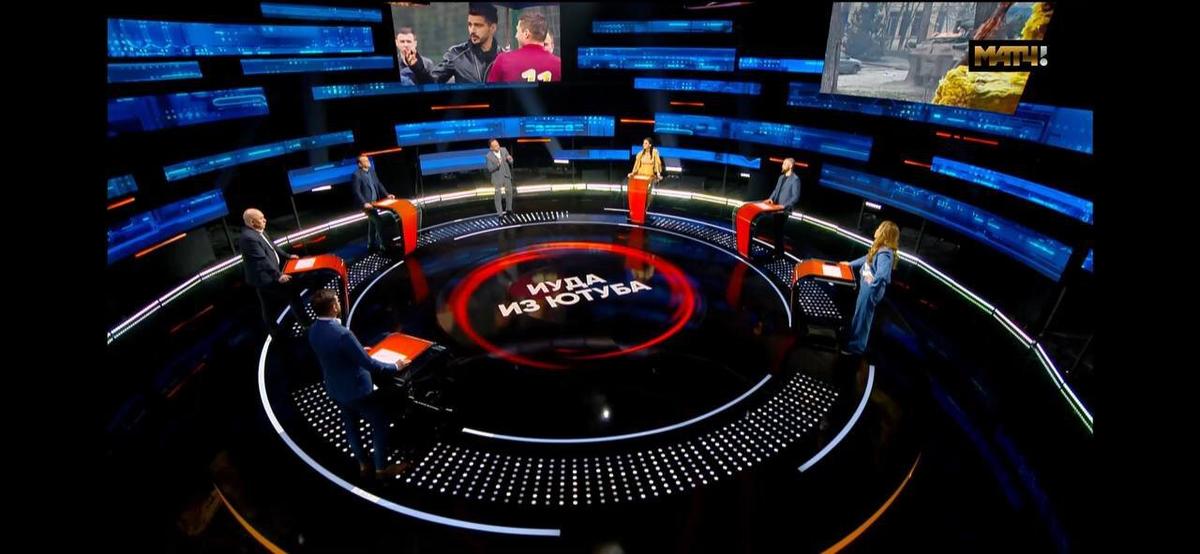Yevgeny Savin, a former Russian footballer and currently a YouTube vlogger, published a video where he spoke to several notable Ukrainian footballers, including West Ham’s Andriy Yarmolenko, Everton’s Vitaly Mykolenko and former Ukraine national team players Andriy Voronin and Oleksandr Aliyev on 18 April. After this, Krasava FC from Russia's 3rd tier, founded and owned by Savin, faced all sorts of problems. He left Russia recently and says the club will be re-established in a different country.
Novaya Gazeta Europe spoke to Savin on how the Russian football and sports TV has decayed — same as the country's politics.

Yevgeny Savin
How did you come up with the idea of making a video featuring Ukrainian footballers?
I was in Norway on 24 February when the war started, I was doing an interview with Nikita Khaykin. Nikita is a goalkeeper for the Russian national team who plays for Bodø/Glimt, a Norwegian side. I saw the news that Russia was shelling Kyiv as I arrived in Norway. Obviously, the European news was different from what was shown on the Russian TV.
I moved my family away from Russia on 26 February to make sure they were in a safe place; and then I decided to sit and watch how the situation would develop. I also texted Andriy Yarmolenko who plays for Ukraine and West Ham and suggested that we have a talk. I was unsure, of course, if Ukraine’s captain would agree to speak with a Russian blogger at all. Happily, he accepted my offer, just like many other Ukrainian players. However, Man City’s Oleksandr Zinchenko refused to be in the video, saying he respected me but was uncomfortable with speaking for the Russian audience as he believed Russian people were unwilling to hear any alternative opinions. They don’t want to hear the truth, they’re brainwashed, he said.
Were you aware of the possible consequences you would face when you published that video?
Of course, I knew there would be pressure upon me and my club. I considered all the pros and cons and, after conferring with my wife, I decided I cannot remain silent in a situation like this. I realised I won’t be able to do anything with my life, I won’t be true to myself if I don’t speak up. So, I chose conscience over fear.
Last year I did a video on football in today’s Belarus where players get expelled from the national team, fans get beaten up and clubs receive various threats — all for supporting the protests against Lukashenka. My lawyer told me recently that there were charges against me in Belarus. I’m facing up to five years in prison should I go there. So, a year ago people asked me if I was going to speak up if the same thing happened in Russia. I told them: well, I hope I will feel brave enough to do that. Now let’s see what happens to me in Russia. I won’t be surprised if they file charges against me as well.
You know what, the day after I published that video, random people called my mum… I heard my mum crying for 50 minutes straight as she phoned me. This never happened before.
Some people would call her and say: “Is this how you brought up your son?” I wished I could find those people; I would ask them: why the fuck are you calling my elderly mother? You could have called me instead. What did I do wrong, do you guys really think I betrayed my country?
I hear some peopled who shared that video on social media were questioned by the police. For instance, an ordinary lad from Perm who owns a small football-related profile on social media was taken to a police station and questioned.
They asked him if someone sponsored me from abroad. I won’t be surprised if I’m going to be declared “foreign agent” soon.
Roman Teryushkov, an MP, suggested that what I’ve said should be “investigated”. I don’t know if they’re investigating anything at the moment. Maybe I’ll win another “trophy” apart from the charges in Belarus.
Did you receive any feedback from the Russian footballers?
One of the national team players sent me a voice message, he was crying, he said he didn’t know how to live on anymore. Some texted me and said: forgive us for not speaking up. Some of the players, Fyodor Smolov, for instance, even shared my video on social media. So, I got some feedback, yes. Many Russian players and coaches told me that going to war against Ukraine was a wrong thing to do. None of them want innocent people to be killed, none of them are supportive of this madness.
But they also know that they are part of a large system. They are bound by fear, money, and their contracts, as well as many other things. Unfortunately, none of them were resolute enough to speak up publicly.
After Russian clubs were suspended from European competitions and the national team was disqualified from the World Cup qualifying playoffs, many people protested, saying that sports and politics should not mix. Should they really?
Let me explain this in the context of my club. We played our first fixture after the winter break away from home. The war was already on at that moment. I was in the UK on that day where I interviewed Andriy Yarmolenko. I tuned in to see my club play that fixture and I saw people around the pitch with pro-war flags and Z symbols there. I was shocked.

Pro-war flags and Z symbols
Then I returned to Russia. Our club was preparing for the home fixture when we received an e-mail from the league where they suggested that we join the “patriotic act” by putting up banners and involving flag bearers. They recommended us to post a banner on our website, reading “We are Russia”. And this is when the pieces of the puzzle fell into place for me. I said that none of us will do this. Nobody’s going to wave flags by command while I’m in charge. You see, compulsory patriotism isn’t something our club will tolerate.
We had been living for a few weeks already knowing the war was on. But you see, even third tier clubs were “strongly recommended” to support this nonsense. I’m not surprised to be fair. 97% of football clubs in Russia get by on state money.
So, what do you think, do football and politics actually mix up? I can see that they do.
Almost all of Russian sports is sponsored by the state. When athletes are asked to attend a nonsense [pro-Putin] rally at the Luzhniki stadium in Moscow, they mostly agree with no hesitation.
Sports is one of the ways to organise mass events in support of the regime.
So, it’s complete bullshit that sports and politics don’t mix up.
Almost 70,000 people attended the Russian Cup Final between Spartak Moscow and Dinamo Moscow on 29 May. We can see that the Russian football is still alive even though our clubs and the national team are banned from international competitions, can’t we?
Of course, football goes on, even in these circumstances; Spartak are celebrating their victory. What else should people do? They attend fixtures, support their clubs, they take each day as it comes. But what’s going to happen in a year or two? I think everyone is asking themselves this question. People are trying to enjoy football while they still have it. This is why they attend games and celebrate.
Many foreign players and coaches have left Russian clubs since March. Rubin and Krasnodar lost most men during this exodus, so to say. Do you think any star players will ever come to Russia in the future?
It’s important to understand why they are leaving. Some countries demand that their players leave Russia, so they obey. Others wish to play European football and develop their careers. I see this as an obvious problem for the Russian football. Our football industry has been devolving each year. If all foreign players leave Zenit, Spartak or Dinamo, our league will suffer a heavy loss.
I don’t see a strong foreigner joining a club in Russia only to play against the likes of Khimki FC. Strong foreigners seek to play European football — and receive hefty paychecks, of course. Neither of this is to be expected in the Russian football in the nearest future.
Who’s going to suffer most from funding cutbacks in Russian football?
The lower leagues, of course. Look, we recently applied for the next seasons licensing. In order to obtain the license, a club must provide a paper which proves their financial assurance. This requires a 100 million ruble [~€1.5 million] annual budget. There’s no way I can assure the league we’re going to have this much money. We are a private club, all our sponsors left us two weeks after the war started.
Third tier licensing requires a club to have a stadium with CCTV and meet a lot of other criteria. We need to pay a lot of taxes as well. We don’t avoid taxation; we don’t pay any hidden or under-the-table wages. And still, an annual budget of 100 million is required.
So, many clubs like ours will cease to exist. Of course, the likes of Zenit, Spartak or CSKA are not going to fold. They will survive, and 70,000 people will attend the Cup finals. But what’s going to happen in the lower leagues? Where are youngsters going to develop themselves? Will any regional clubs survive?
Well, some of the clubs will still be sponsored by the local authorities, of course. It’s safe to say that some of them will, but it’s state money after all. What are privately owned clubs to do?
MatchTV [a state-owned sports channel] made a long way from broadcasting a show where you and Yury Dud were hosts — to the “YouTube Judas”, a talk show episode where people came to defame you for speaking up, in just seven years. This talk show does not even have anything to do with sports. How did that happen?
Yes, people threw mud at me and called me a traitor. When the episode was aired, a few MatchTV pundits unrelated to the episode texted me. They apologised and assured me they had nothing to do with it.
Look, the Russian football is a perfect reflection of what Russia truly is. There’s nothing to be surprised about. If you try and watch Channel One or Channel Two, you’ll see that it’s almost the same thing on every channel. I decided to let the Ukrainian players have their say on my YouTube. This is an alternative opinion to what they show on TV.
In return, MatchTV gathered a laughing stock in their studio for this episode. What has Alana Mamyeva [ex-wife of a notorious Russian footballer Pavel Mamayev] to do with sports punditry at all? All they did there was throwing mud at me. They said that I had to go to prison, that I needed to have my citizenship revoked, that I had to be spit in the face.
But if you switch the channel, there would be the same level of hatred anywhere. So, it’s not surprising football is no different.

Еpisode MatchTV
CSKA Moscow and Zenit Saint Petersburg both won the UEFA Cup in the 2000s, CSKA reached the Champions League quarterfinals in 2010, the national team played in the semifinals at EURO 2008. We had players in the English Premier League, Rubin was a major giant killer in Europe, beating Tottenham and Barcelona. The Russian football enjoyed great success back then. Now it’s all different. How did we come to what’s going on now then?
Our football and our league have been devolving each season for a number of reasons. Reason number one is state money. None of our clubs are interested in making money this day, they simply enjoy receiving state money each season. They spend money on foreign players or set up overpriced contracts with Russian players due to their citizenship. In 2020, we had three clubs in the Champions League group stage. These three clubs only won one fixture out of the 18 matches played.
Zenit Saint Petersburg has an annual budget of 18 billion rubles [€265 million]. Look, Leonid Slutsky was managing SBV Vitesse in the Dutch league when I came to interview him. He had a long list of objectives he had to fulfil in order to keep his job. He had to reach European spots each season so that the club would receive UEFA money. The club’s strategy required selling three squad players each year and replacing them with three academy players for future financial success. In Europe, football clubs are privately owned, and they must rely on managing their own business instead of wasting state money.
Reason number two behind the decline of the Russian football is the foreign limit. Someone told Putin that Russian players should be protected by the league regulations, and now we have Russian lads playing in an uncompetitive environment as the clubs are forced to fill in home-grown positions. As a result, these players earn much more money than they deserve. They are losing touch with what real life is, they are golden boys who go nuts because of all the money they have. Do you know how many Russian players are currently with clubs in major European leagues? Alexander Golovin of AS Monaco is the only regular starter at a major European club, Denis Cheryshev and Alexey Miranchuk also play in proper leagues, but they are mostly benchwarmers. Other players are wasting their careers in the domestic league.
State money and foreign limit are the two things that should be removed from the Russian football.
It’s not going to be easy for the clubs to become self-sufficient in the blink of an eye, of course. But they need to learn how to live up to their income and how to bring in investments step by step. However, nobody’s going to do this since sports is a tool for political manipulation in Russia.
What’s going to happen to Krasava FC?
I find it crucial to save the club, save its colours and the badge, as well as some of its current players. But now I can’t even find a ground for the club to finish the current season at. We were cast out from our ground in Krasnogorsk after I published that video. We were unofficially banned from playing football in the Moscow region.
We are unable to find a stadium to play home fixtures at simply because I, as the club’s chairman, spoke up against the war. But what did our players and personnel do wrong anyway?
We are about to leave Russia, staying there is out of the question. But we do hold our heads high. We need to finish the current season first, we still have some fixtures left, and then we’re off. Our most possible destination will be Cyprus.
Do you think you’re leaving Russia temporarily?
It was a tough decision for me to leave, I had to explain this to my children. My kids aren’t old enough to understand why we are leaving Russia. It is most likely that we are not coming back to Russia while the current regime is there. Being honest with myself is the most important thing for me now. One can settle in any country if they haven’t lost themselves. Anyway, we’re not coming back to Russia before something (or someone) doesn’t change in the Kremlin.
Translated by Alexander Pracht
